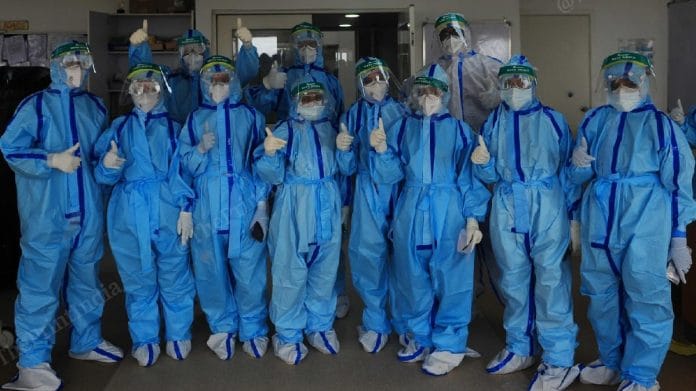It isn’t what we say or do that matters, how it lands on others is what makes a difference.
This is true in every aspect of life — from our interpersonal relationships to the news we read everyday. All of us are facing immensely challenging situations each day at a personal level and it is hard to stay empowered through it all.
My husband and I are both doctors dealing with the pandemic, personally, through the care of people in our own lives, and professionally through the patients we see everyday in our hospitals. We also feel responsible for the country at large.
I lost my mother in-law due to severe Covid last week. She got the best care, the best team of doctors and paramedics and yet we sat there helplessly as she crashed in front of us. As doctors, witnessing this happen to someone close to you leaves life entirely meaningless.
I am still undergoing my final year of radiology training and our job is to score all the Covid CT scans daily. There are around a 100 scans done every day and it’s horrific to imagine everyone being someone’s mother, father, son and daughter going through the healthcare system when it is so burdened and falling short of resources.
Since healthcare workers were vaccinated first, the risk of infection has been comparatively lower this wave. The more challenging work is to keep our families safe.
Glitches in govt systems
The government has done a tremendous job in handling the situation at large.
There is a Bruhat Bengaluru Mahanagara Palike (BBMP) set-up that arranges beds for Covid-positive patients through calls. The information is also updated on their website and the same is communicated to the hospital.
Ambulances have increased in number and many of them even have higher forms of ventilation available such as the NIV (non-invasive ventilation). Special crematoriums have been arranged for the departed with several NGOs supplying food and water in concern for the health of the rest of the family who go there for the last rites.
However, what’s alarming is how this affects the general population. About 50 per cent of the beds in all private hospitals have been handed over to the BBPM to be booked under it and the money for the same is given by the state government.
Treatment through this channel does not cost a single penny for the patients.
However, hospitals claim that the beds ‘booked’ through BBMP does not mean ‘confirmed’ and they ask us to have a word with the hospital administration before we take in a patient whose saturation is dropping and is in dire need of oxygen.
In my own experience, I’ve had the BBMP asking me to Google the hospital phone number as they did not have the information. I’ve had hospitals claiming that there are no beds in spite of it having been booked through this channel. I’ve had to beg senior officials using words like “any bed will do, we are ready to pay for the private bed”.
Astronomical costs of medical supplies
Oxygen concentrators, ivermectin, remdesevir, tocilizumab, high dose vitamin C, steroids — all these terms have been learnt by every layman in the society right now.
There are a dozen videos on how they work and when to be used. What’s shocking is how their prices have shot up in these past few weeks. Even Betadine gargles are more expensive now.
The cost of ambulances is at least four times higher. The cost of a chest CT scan at a private hospital is Rs 8,000. There were regulations to curb these costs lately, but none have taken effect at the site of war yet. The surprising thing is doctors have not increased the cost of consultation. In fact more of us want to volunteer and be of service, in spite of being broken inside with things going on in our own personal lives.
This article is to briefly showcase what is really going on at the site of war on ground level.
The intentions of the healthcare system and the government are good, however the way they land on us when in need is another phenomena all together. The challenge is to bridge the gap between the two and be more prepared in the future.
My sincere condolences go out to all those who lost someone during this time. It is important to forgive yourself, grieve fully and celebrate that person each day. I am still in the grieving process and we all breakdown now and then.
One thing the pandemic has made visible is how uncertain life has always been. But we need to learn how to make life work with things we don’t have and can never come back.
Dr. Samanvitha Gode is a student of M.S. Ramaiah Medical College, Bengaluru






